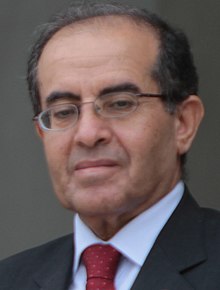
Back محمود جبريل Arabic Махмуд Джыбрыль BE-X-OLD Mahmud Jibril Catalan Mahmúd Džibríl Czech Mahmud Dschibril German Mahmoud Jabril Spanish Mahmoud Jibril Basque محمود جبرئیل Persian Mahmoud Jibril French Mahmud Xibril Galician
Mahmoud Jibril محمود جبريل | |
|---|---|
 Jibril in 2011 | |
| Prime Minister of Libya | |
| In office 5 March 2011 – 23 October 2011 | |
| President | Mustafa Abdul Jalil |
| Deputy | Ali Abd-al-Aziz al-Isawi Ali Tarhouni |
| Preceded by | Baghdadi Mahmudi |
| Succeeded by | Ali Tarhouni (Acting) |
| Minister of Foreign Affairs | |
| In office 5 March 2011 – 22 November 2011 | |
| Prime Minister | Himself Ali Tarhouni (Acting) Abdurrahim El-Keib |
| Preceded by | Abdul Ati al-Obeidi |
| Succeeded by | Ashour Bin Khayal |
| Leader of the National Forces Alliance | |
| In office 14 March 2012 – 5 April 2020 | |
| Preceded by | Position established |
| Succeeded by | TBD |
| Personal details | |
| Born | Mahmoud Jibril el-Warfally 28 May 1952[1] Benghazi, Libya[2][3] |
| Died | 5 April 2020 (aged 67) Cairo, Egypt |
| Cause of death | Cardiac arrest and complications from COVID-19 |
| Political party | National Forces Alliance |
| Alma mater | Cairo University University of Pittsburgh |
Mahmoud Jibril el-Warfally[4] (Arabic: محمود جبريل الورفلي), also transcribed Jabril or Jebril or Gebril (28 May 1952 – 5 April 2020),[5] was a Libyan politician who served as the interim Prime Minister of Libya for seven and a half months during the overthrow of Muammar Gaddafi and the Libyan Civil War, chairing the executive board of the National Transitional Council (NTC) from 5 March to 23 October 2011.[6][7] He also served as the Head of International Affairs.[8] As of July 2012[update], Jibril was the head of one of the largest political parties in Libya, the National Forces Alliance.[9]
Toward the end of the conflict, Jibril was increasingly referred to by foreign governments and in media as the interim prime minister of Libya.[10] Jibril's government was recognized as the "sole legitimate representative" of Libya by the majority of UN states including France, Turkey, the United Kingdom, the United States, Iran, and Qatar.[11][12]
- ^ Date information sourced from Library of Congress Authorities data, via corresponding WorldCat Identities linked authority file (LAF).
- ^ "Pitt Alumnus Mahmoud Jibril—President of Libya's National Forces Alliance and Former Prime Minister of Libya—to Present Distinguished Lecture on Campus Oct. 31". University of Pittsburgh. Retrieved 2 April 2013.
- ^ "Libya: Moussa Koussa 'tried to get job in new government'". The Daily Telegraph. London. 8 September 2011.
- ^ "Libyan rebels look to Pitt grad for voice | TribLIVE". Pittsburgh live. Archived from the original on 25 December 2011. Retrieved 7 March 2013.
- ^ Alwasat News. "Former Libyan PM Mahmoud Jibril has died from complications related to coronavirus". En.alwasat.ly. Retrieved 5 April 2020.
- ^ "The Executive Board of the National Transitional Council". National Transitional Council. Archived from the original on 27 July 2011. Retrieved 25 July 2011.
- ^ Friedman, Uri (23 March 2011). "Libyan Rebels Name Mahmoud Jibril Their Prime Minister". The Atlantic. Archived from the original on 2 August 2011. Retrieved 27 July 2011.
- ^ "Excerpts from Libya Contact Group Chair's Statement". Reuters Africa. Reuters. 15 July 2011. Archived from the original on 25 July 2012. Retrieved 25 July 2011.
- ^ Chris Stephen Muslim Brotherhood fell 'below expectations' in Libyan elections The Guardian, 10 July 2012
- ^ Peralta, Eyder (13 May 2011). "Libyan Opposition Leader: The Revolution Is Led By 'New Breed Of Generations'". National Public Radio. Retrieved 21 July 2011.
- ^ "Libyan opposition fights for recognition both at home and abroad". Deutsche Welle. 5 April 2020. Retrieved 5 April 2020.
- ^ "U.S. recognition of new Libyan government raises tough legal questions". Washington Post. 19 July 2011. Retrieved 5 April 2020.